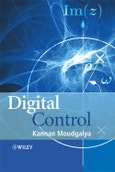- Teaches the fundamentals of digital control, enabling the student to exploit the complete potential of digital systems.
- Presents a number of control techniques including proportional-integral-derivative (PID), pole placement, internal model, minimum variance, model predictive and linear quadratic Gaussian control and their extensions.
- Provides an extensive introduction to digital signal processing, an essential component to the understanding and implementation of digital controllers; and to the identification of plant models, an important topic in this information era.
- Includes examples, problems and solutions as well as accompanying MatLAB code.
Digital Control offers an advanced and self-contained textbook to senior undergraduates and postgraduates in chemical, electrical and mechanical engineering and computer science. It will also appeal to practicing systems engineers who need to learn digital control.
Table of Contents
Preface.Acknowledgements.
List of Matlab Code.
List of Acronyms.
1. Introduction.
2. Modelling of Sampled Data Systems.
I: Digital Signal Processing.
3. Linear System.
4. Z-Transform.
5. Frequency Domain Analysis.
II: Identification.
6. Identification.
III: Transfer Function Approach to Controller Design.
7. Structures and Specifications.
8. Proportional, Integral, Derivative Controllers.
9. Pole Placement Controllers.
10. Special Cases of Pole Placement Control.
11. Minimum Variance Control.
12. Model Predictive Control.
13. Linear Quadratic Gaussian Control.
IV: State Space Approach to controller Design.
14. State Space Techniques in Controller Design.
Appendix A. Supplementary Material.
References.
Index.
Index of Matlab Code.








